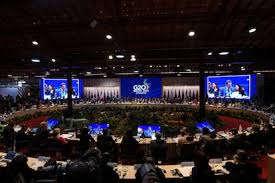Add your promotional text...
The annual G-20 summit, the forum that brings together the world's largest economies, is scheduled for this weekend in Johannesburg
. At this meeting, the South African presidency seeks to make progress on issues relevant to the Global South. However, the summit is being shaken by the geopolitical earthquake of the US project for Ukraine. Volodymyr Zelensky, the president of Ukraine, and European leaders have launched urgent negotiations to develop a joint response to the plan that the White House has designed without consulting them. Ursula von der Leyen, president of the European Commission, indicated that European leaders will hold a meeting this Saturday outside the summit. The Johannesburg summit, which is marked by notable absences—also absent will be Xi Jinping, leader of China; Claudia Sheinbaum, president of Mexico; and Javier Milei, president of Argentina—will not include Donald Trump and Vladimir Putin, two of the most important diplomatic figures regarding Ukraine. This casts a shadow over the possibility of reaching significant agreements at the meeting. On the other hand, the participation of key European leaders is still planned. The G-20, an organization representing 87% of global GDP and 62% of the world's population, has no executive power; however, since the 2008 crisis, it has become a fundamental instrument for coordinating the most important countries in an increasingly interconnected world with challenges that are impossible to solve without transnational cooperation. Therefore, its declining effectiveness is an alarming indicator. Below are some of the crucial aspects of the summit, in addition to the Ukrainian crisis.
11/22/20251 min read


Contenido de mi publicación
